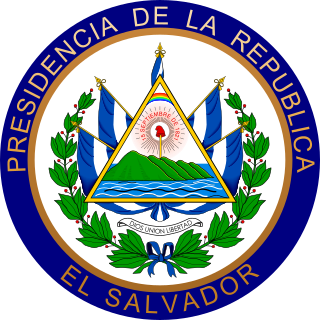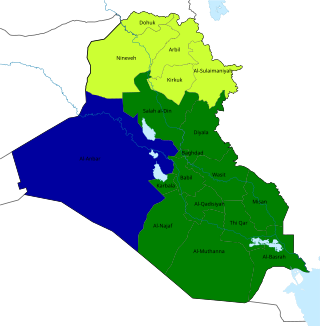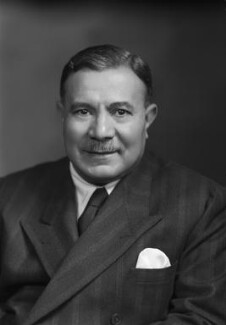Iraq is a federal parliamentary representative democratic republic. It is a multi-party system whereby the executive power is exercised by the Prime Minister of the Council of Ministers as the head of government, the President of Iraq as the head of state, and legislative power is vested in the Council of Representatives.

Ibrahim Abdul Karim al-Eshaiker, better known as Ibrahim al-Jaafari, is an Iraqi politician who was Prime Minister of Iraq in the Iraqi Transitional Government from 2005 to 2006, following the January 2005 election. He served as Minister of Foreign Affairs from 2014 to 2018.

The Liberals of Andorra is a conservative-liberal political party in Andorra. It is a member of the Liberal International and the Alliance of Liberals and Democrats for Europe.

The president of the Republic of El Salvador is the head of state and head of government of El Salvador. The president is also the commander-in-chief of the Armed Forces of El Salvador.

Parliamentary elections were held in Iraq on 30 January 2005 to elect the new National Assembly, alongside governorate elections and a parliamentary election in Kurdistan Region. The 275-member legislature had been created under the Transitional Law during the international occupation. The newly elected body was given a mandate to write a new constitution and exercise legislative functions until the new constitution came into effect. The elections also led to the formation of the Iraqi Transitional Government.

Parliamentary elections were held in Iraq on 7 March 2010. The elections decided the 325 members of the Council of Representatives who would elect the prime minister and president. The elections resulted in a partial victory for the Iraqi National Movement, led by former Interim Prime Minister Ayad Allawi, which won 91 seats, making it the largest alliance in the Council. The State of Law Coalition, led by incumbent Prime Minister Nouri Al-Maliki, was the second largest grouping with 89 seats.
Parliamentary elections were held in Iran on 15 April 1984, with a second round on 17 May. The majority of seats were won by independents, whilst the Islamic Republican Party was the only party to win seats. Voter turnout was 65.1% in the first round.
The National Progressive Front was an Iraqi popular front announced on 16 July 1973 and constituted in 1974, ostensibly formed within the framework of a "joint action programme" to establish a coalition between the Arab Socialist Ba'ath Party, the Iraqi Communist Party, the Kurdistan Revolutionary Party, a pro-government section of the Kurdistan Democratic Party, and miscellaneous independents. The Iraqi Communist Party were removed from the NPF in 1979 while the Kurdish Democratic Party suffered restrictions when Saddam Hussein came to power after 1979. The creation of the Front ensured the leading role of the Ba'athists in state and society whilst allowing limited autonomy for other participating parties loyal to the government. Saddam spoke of it once as "one of the essential forms to voice our will and to deepen democracy and political participation of the people and the national forces in building the new experiment in all fields." In effect the Front was controlled and maintained solely by the Ba'ath, with all other legal political forces acting in subservience to it.
Parliamentary elections were held in Iraq on 9 June 1954, although they were delayed until 14 June in some areas due to social upheaval. The Constitutional Union Party remained the largest party in the Chamber of Deputies, winning 50 of the 135 seats, although 53 were won by independents. Despite the government creating obstacles for opposition candidates, they were described as "undoubtedly the freest elections in Iraqi history" in 2001.
Parliamentary elections were held in Iraq on 20 June 1980, the first since 1958. The elections were contested by around 860 candidates and saw the Ba'ath Party win 187 of the 250 seats. Voter turnout was approximately 80%.
Parliamentary elections were held in Iraq on 20 October 1984. The elections were contested by 782 candidates, and saw the Ba'ath Party win 183 of the 250 seats.
Parliamentary elections were held in Iraq on 24 March 1996. The elections were contested by 689 candidates, although 30 MPs were appointed to represent Iraqi Kurdistan. The result was a victory for the Ba'ath Party, which won 161 of the 250 seats. Voter turnout was reported to be 93.5%.
Parliamentary elections were held in Iraq on 27 March 2000. The elections were contested by 522 candidates, including 25 women. Whilst there were a number of candidates, all independent candidates were nominally loyal to the Ba'ath Party, and the rest of the candidates were party members.

General elections were held in Kuwait on 20 October 1992. A total of 275 candidates contested the election, which saw independents win the largest number of seats, and candidates opposed to the government win a total of 31 seats. Voter turnout was 83.2%.

Sayyid Salih Jabr was an Iraqi statesman who served as Prime Minister of Iraq from March 1947 to January 1948. Jabr was the first Shi'i Muslim to become the prime minister of his country and throughout his career held several offices around the country such as the office of minister of justice, education, foreign affairs, interior, and finance.
Parliamentary elections were held in Hungary on 25 and 26 January 1920. However, they were only held in 164 districts. After the Treaty of Trianon was signed, the 44 districts previously occupied by Romania voted between 13 June and 5 July, whilst the 11 districts occupied by Serbia did not vote until 30 and 31 October 1921. The election was held with compulsory voting. In protest at this and other changes to the franchise that left 60% of the voting age population unable to vote, the Hungarian Social Democratic Party boycotted the elections, and called for its supporters to cast invalid votes, resulting in an unusually high number of blank or invalid votes – 12% in the January elections and over 20% in Budapest and other major cities.
Parliamentary elections were held in Iraq on 4 August 1935 to elect the members of the Chamber of Deputies.
Parliamentary elections were held in Iraq on 18 December 1937 to elect the members of Chamber of Deputies.
Parliamentary elections were held in Iraq between 20 August and 5 October 1943. The election of the secondary voters was carried out between 20 and 31 August 1943, whilst the election of the members of Chamber of Deputies was held on 5 October 1943.
Parliamentary elections were held in Iraq between 21 November 1946 and 10 March 1947 to elect the members of the Chamber of Deputies.








